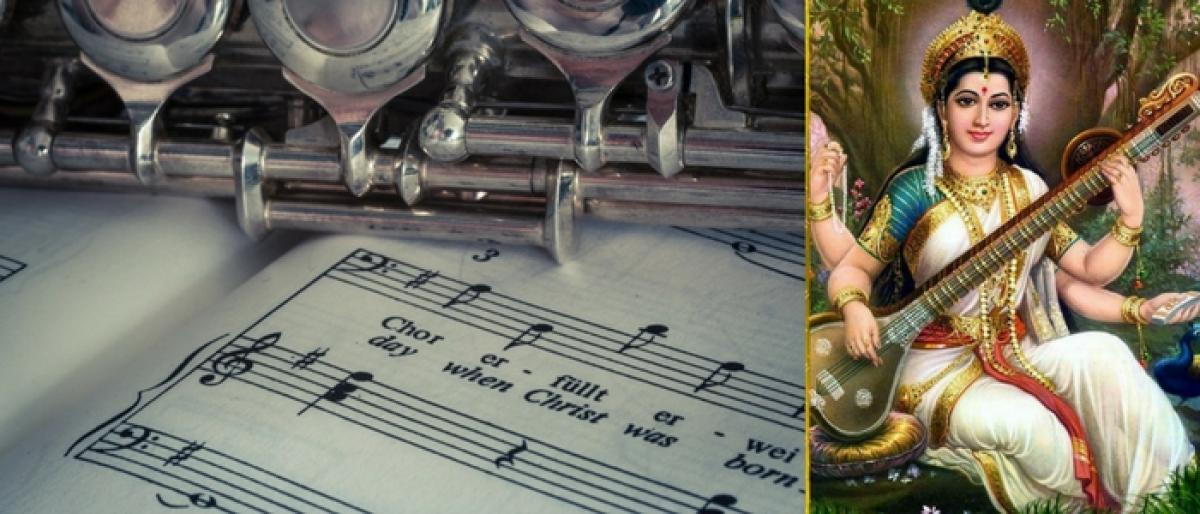Live
- VIP Treatment: Exclusive Benefits for High Rollers in Online Casino
- LS polls: Union Minister Bhagwanth Khuba, Dingaleshwara seer, Priyanka Jarkiholi file nominations in K'taka
- Amid show of strength, Congress’ Praniti Shinde files nomination from Solapur
- Tamil Nadu Police gives clean report to Isha Foundation in missing volunteers case
- Home Minister Amit Shah to address public meeting in Goa on April 24
- Gurgaon Open: M Dharma fires 67 for two-shot lead on penultimate day
- Sharad Pawar made many attempts to finish Shiv Sena, claims Maha minister
- Former England opener Raman Subba Row dies aged 92
- IPL 2024: Impact player rule is affecting the progress of half all-rounders, says Zaheer Khan
- ‘Teppa samudram’ review: Entertains with twists and turns
Just In

Beauty, truth, wonder, love, religion – these strange and difficult words laid the roots of the most curious of all activities of mankind, namely the pursuit and appreciation of the fine arts.
Beauty, truth, wonder, love, religion – these strange and difficult words laid the roots of the most curious of all activities of mankind, namely the pursuit and appreciation of the fine arts.
Entertainment is meant to make us feel better at the end of a day's work. It helps us to relax. Without that life would be dull; our breaks from the daily labour would comprise merely staring at the wall or watching the grass grow!
The fine arts which include, among others, music, dance, painting, sculpture, drama and literature, can alter our moods and thoughts and even our bodies internal processes – a gift originally thought to be processed only by human beings but now known to extend to animals and plants.
Listening to music, especially of different types, has a soothing effect on our minds and bodies. Music is known to reduce heart rate and blood pressure and also decrease the levels of stress hormones in the body.
It has also been shown that music is beneficial for those who have medical conditions. Some have even claimed that music can remove pessimistic dreams and help one concentrate better at the workplace.
Singing, for instance, can slow and regulate breathing and promote relaxation. That is probably why, all over the world, it has been a practice to sing lullabies to babies to put them to sleep!.
Music is an emotion people can share with or without words, a strong and powerful means of effective communication. It helps get rid of anger and aggression and, if one is in a bad mood and feeling gloomy, prove to be a remarkably effective palliative.
Music is God's gift to humanity and appeals to the old and the young, man and beast alike. It has a humanising influence and is a powerful factor in the moulding of character. It suppresses the baser instincts and develops nobler ones and is one of the joys of being a human being.
Dullness of mind and the monotony of routine life are considerably relieved by listening to good music.
Music is also the common mother tongue of humanity and the universal language and feeling – a great unifying the force.
It is the cheapest of the arts to cultivate and enjoy. Its study and practice give elegance, grace, charm, gentleness and refinement. Great composers such as Thyagaraja, Dikshitar and Shana Sastry have enriched the musical wealth of humanity by their precious compositions and made life in this world worth living. Music is universal and is above religion, race, caste and creed, a force that carries us further than words.
Music, as we know, has taken various forms in various parts of the world.. We thus have Western music, Arabian music, Oriental music and Indian music among other forms. Each such type of music has at least two different forms namely classical and light which can be presented in the vocal or instrumental verities.
Musical accomplishments have often been seen to go hand-in-hand with skills in other spheres of activity. Some of the Hindu mythological and Gods and Goddesses are portrayed, as did Lord Shiva, also played the Dhumroo, historical personalities such as, musicians.
Valmiki tells us of Rama's attainments on music. Sri Krishna used to play the flute. Godess Saraswati plays the VeenaPeople Vidyaranyapura, Govinda Dikshitar, (prime minister during the time of Raghunath Naik) and kings like Swati Jirunal were great musicians.
And the Nobel Prize winning litterateur, painter and bard Rabindranath Tagore developed a genre of music which came to be called Rabindranath Sangeet of the with varied themes which is immensely popular and has had an impact on the Bengali ethos that is comparable to the which Shakespeare had on the English-speaking world.
His compositions are regarded as cultural treasures not only of West Bengal but the whole of India.Albert Einstein was a good violinist (as was the fictional Shedlock homes!), Paderewski (the prime minister of Poland) was a good pianist – as was Raja Ramana the Indian scientist who, for sometime, was a Union Minister.
A person who does not learn, or at least learn to appreciate, good music is depriving oneself of a gift given by nature.
Studies have shown that music enhances athletic performance by drawing one's attention away from feelings of fatigue and pain and promoting flow - states of internal motivation.
Little wonder then, that, from times immemorial, art and culture have been known to have the capacity to trigger reflection, generate empathy, create a dialogue and foster new ideas and relationships, thus offering a powerful and democratic way of living a life motivated by much more than mere profit.
Little wonder then, that in his Merchant of Venice, Shakespeare says "the man that hath no music….is fit for treasons .....!"

© 2024 Hyderabad Media House Limited/The Hans India. All rights reserved. Powered by hocalwire.com







